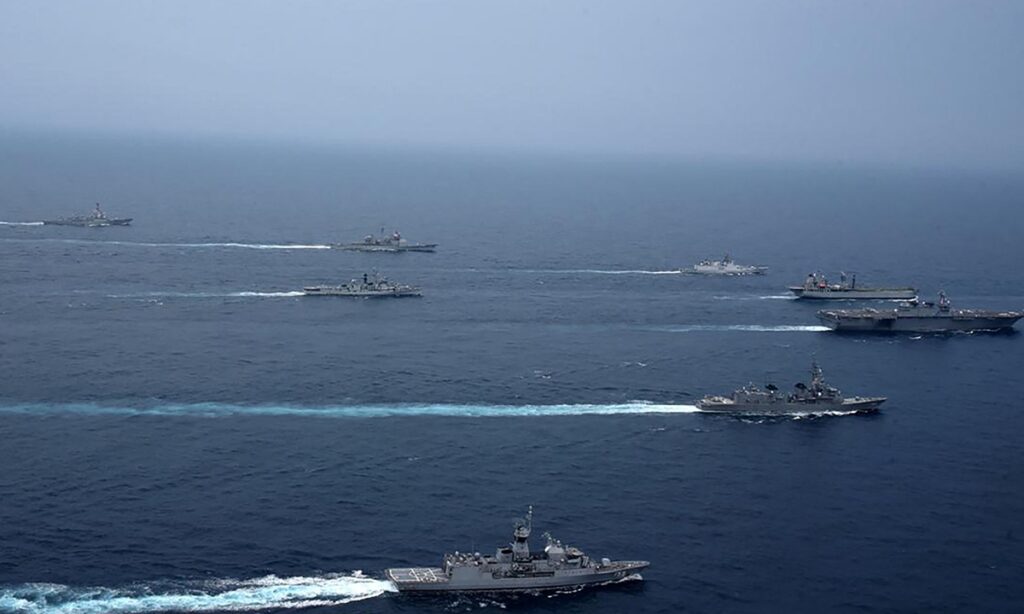The newly signed roadmap by India and France on the blue economy and ocean governance has been, not surprisingly, hyped by some nationalist Indian media outlets as Delhi’s latest efforts to counter so-called China’s aggressive policies in the Indo-Pacific region, which are seen by Chinese analysts as another shameless attempt to smear China.
The roadmap issued during Foreign Minister Subrahmanyam Jaishankar’s visit to Paris has been accompanied by groundless accusations against Beijing such as a debt trap of the China-proposed Belt and Road Initiative and the country’s illegal fishing around India, Indian local media reported.
The Indian foreign minister is on a three-day visit to France, and the two countries have reportedly agreed to nurture a high quality dialogue on maritime security to enable them to raise strategic issues in the Indo-Pacific and to adapt to new challenges due to Chinese presence in the region, while stressing the importance they attach to the international law of the sea, Financial Express reported.
The report also claimed that Chinese fishing trawlers were “controlled” by the People’s Liberation Army and they serve to implement China’s agenda of “ocean grabbing.” The report accused the Chinese trawlers of being equipped with sophisticated intelligence and surveillance systems and even carrying live ammunition, and they “amount to incremental strategies of asymmetrical advantage to possess a gradual maritime foothold in waters surrounding India.”
This is a lie of some Indian media, Chen Xiangmiao, an assistant research fellow at the National Institute for South China Sea Studies, told the Global Times on Tuesday. “All civilian vessels of China must not be armed, which is strictly regulated by Chinese authorities and the fishers are working only in waters where China and relevant countries agreed upon.”
Qian Feng, director of the research department at the National Strategy Institute at Tsinghua University, said that it is very regrettable to see the political correctness of smearing China have gone rampant in the South Asian nation, which would only harm the credibility of certain media organizations and deepen misunderstandings between India and China.
Qian cited an incident in April 2021 when a US guided missile destroyer violated India’s rule and sailed through India’s Exclusive Economic Zone, pointing out that “It was the US that threatened India’s security in the Indian Ocean, while China has never.”
The roadmap between Paris and Delhi is a work driven by the shared interests of the two countries as they want to create a platform where they can lead. But the exclusiveness of the document would very likely prevent the platform from reaching out to other stakeholders in the region, let alone as an effective structure as the multilateral Belt and Road Initiative, Chen pointed out.
The roadmap came after India appointed its first National Maritime Security Coordinator (NMSC). Former Navy Vice Chief Vice Admiral G Ashok Kumar was selected for the post, media reported.
The NMSC works in coordination with the National Security Council Secretariat headed by NSA Ajit Doval. They said the NMSC is tasked to coordinate the Indian Navy, the Coast Guard, security agencies involved in coastal and maritime security and 13 coastal states and Union Territories.
Chinese experts interpreted these moves as a sign that Delhi is attaching increasing importance to the country’s maritime domain, and they also pointed out there is a gap of mutual understanding between Beijing and Delhi in the field.
Qian told the Global Times on Tuesday that it showed the Modi administration has elevated maritime interests to a national level.
As two developing countries with the largest populations in the world, they share more common interests than divergences in the process of becoming maritime powers, Chen said, noting “the nationalist sentiment has misled India to grow anxious with an increasingly strong Chinese navy.”
There is a greater room for cooperation in the Indian Ocean between the two such as in sea route security by combining efforts to combat maritime piracy and dealing with climate and maritime environmental issues from the standpoint of emerging developing countries, analysts said.
It would be odd to exclude China, one of the biggest beneficiaries of the Indian Ocean ship line that supports its volume of trade to Europe and Africa, from the security efforts in the region, Chen said.
This handout photo released by the Indian Navy on October 12, 2020 shows ships during the second phase of the Malabar naval exercise in which India, Australia, Japan and the US are taking part in the Bay of Bengal in the Indian Ocean. Photo: VCG



